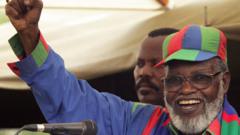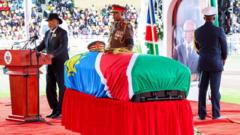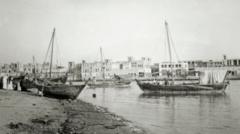Sam Nujoma, revered as the "father of the nation," passed away at the age of 95 after spending three weeks in the hospital. His legacy is unfathomably tied to Namibia’s struggle for independence from colonial rule, transforming the nation’s identity and unifying its diverse communities.
Sam Nujoma: A Life Committed to Namibia’s Liberation and Unity

Sam Nujoma: A Life Committed to Namibia’s Liberation and Unity
Remembering the legacy of Namibia's founding father, who steered the nation towards independence and unity.
In a profound loss for the nation, Sam Nujoma, the prominent leader who fought valiantly for Namibia’s independence, has died at the age of 95. His warm and relatable demeanor made him a beloved figure among Namibians, and for many years, he embodied the spirit of the nation.
Nujoma's journey began in modest surroundings; born in the northern village of Etunda, he emerged as a significant leader in the independence movement after being inspired by early resistance figures. His activism was catalyzed by the oppressive policies of both German and later South African colonizers, igniting a passion for freedom that would define his life.
The early 1960s saw Nujoma assume critical roles within independence movements, eventually leading the South West Africa People’s Organisation (SWAPO) while in exile. Despite the South African government branding him as a "Marxist terrorist," he sought international support to combat apartheid. By 1990, following years of guerrilla warfare and significant socio-political shifts, Namibia gained its long-awaited independence.
As the first president, Nujoma prioritized social issues, especially those impacting children and women, striving to enact reforms while maintaining a delicate balance of power within his administration. His presidency, marked by a mix of achievements and criticisms—particularly regarding his governance style and the constitutional amendments that allowed him to extend his tenure—remains a subject of discussion.
After stepping down in 2005, Nujoma remained influential behind the scenes, overseeing the political integrity of SWAPO and the nation's continued democratic processes. His ability to unite Namibia’s diverse population earned him accolades both domestically and internationally, including the title of "Founding Father of Namibia."
In his later years, he chose to withdraw from the public eye, focusing on his family and enjoying the quieter aspects of life. Today, he is celebrated for his easy charm, unyielding spirit, and most significantly, for the nation he helped to forge from the remnants of colonial oppression. Nujoma leaves a legacy that will shape Namibia for generations to come, embodying the perseverance and hope of freedom that define the country’s history.
Nujoma's journey began in modest surroundings; born in the northern village of Etunda, he emerged as a significant leader in the independence movement after being inspired by early resistance figures. His activism was catalyzed by the oppressive policies of both German and later South African colonizers, igniting a passion for freedom that would define his life.
The early 1960s saw Nujoma assume critical roles within independence movements, eventually leading the South West Africa People’s Organisation (SWAPO) while in exile. Despite the South African government branding him as a "Marxist terrorist," he sought international support to combat apartheid. By 1990, following years of guerrilla warfare and significant socio-political shifts, Namibia gained its long-awaited independence.
As the first president, Nujoma prioritized social issues, especially those impacting children and women, striving to enact reforms while maintaining a delicate balance of power within his administration. His presidency, marked by a mix of achievements and criticisms—particularly regarding his governance style and the constitutional amendments that allowed him to extend his tenure—remains a subject of discussion.
After stepping down in 2005, Nujoma remained influential behind the scenes, overseeing the political integrity of SWAPO and the nation's continued democratic processes. His ability to unite Namibia’s diverse population earned him accolades both domestically and internationally, including the title of "Founding Father of Namibia."
In his later years, he chose to withdraw from the public eye, focusing on his family and enjoying the quieter aspects of life. Today, he is celebrated for his easy charm, unyielding spirit, and most significantly, for the nation he helped to forge from the remnants of colonial oppression. Nujoma leaves a legacy that will shape Namibia for generations to come, embodying the perseverance and hope of freedom that define the country’s history.























